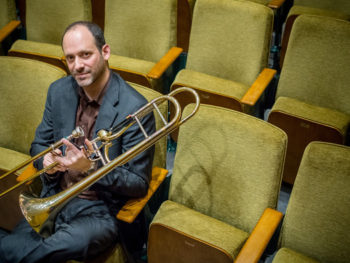
This article is reprinted with permission from Tony’s blog The Music Parent’s Guide.
Greatness in teaching is just as rare as greatness in any other profession. Although it’s impossible to offer a prescription of qualities in order to cultivate great music teachers, understanding these qualities can give all would-be teachers a standard of excellence to strive for, and guide schools and parents toward what they should look for in current and prospective teachers.
Here are just a few characteristic traits that I believe all great music teachers have:
Great teachers connect to their students on an emotional level. We all remember how teachers we really respected made us feel. We remember the teachers who saw something special in us and identified with us on some level. Before we teach, we must show that we care — and there are many ways to do this. The best way is the one that comes natural, and for me that is humor — but it can be anything from eye contact, a strong sense of empathy, or something else that indicates that the teacher truly “sees” the needs of each individual student.
Great teachers don’t look to make everyone feel warm and fuzzy all the time. There are a lot of school music teachers who strive to have all of their students “like” them. They look to ensure that all of their students are happy and comfortable at all times, making sure that there is not too much effort involved with rehearsing and learning. These teachers usually run entire pieces of music and cover a lot of material in a short period of time –they tend to not “dig in” to small sections and have a laissez-faire approach to developing young musicians. Great teachers, however, command respect and are not afraid to stretch their students’ comfort zone in order to teach them how to strive toward achieving greatness.
Effective teachers are great communicators of knowledge. You will rarely walk into a great teacher’s rehearsal and see them giving long speeches. Highly effective music teachers keep the concepts at the highest level but the explanations short and incredibly clear. A great teacher has a target they are aiming their students toward and do everything in their power to guide them toward it in the most efficient manner. Often times, the most useful information is delivered in a few seconds between the action (in our case, making sounds) that should be occurring throughout the majority of class time.
Great music teachers love fundamentals (and know how to “sell” them to their students). Wise music teachers understand that technique is essential, and that proper technique can be taught during a school day, no matter how many students are in the class. These teachers are not afraid to go back to the beginning of a method book and honor the foundations of playing a musical instrument. Not only will a great teacher understand that building blocks such as posture, breathing, and hand position are critical to beginners, they also understand that these fundamentals must be constantly reinforced throughout their student’s schooling. Great teachers do not abandon fundamentals in order to “teach to a concert” — they ensure that their concert repertoire is an extension of strong musical foundations.
Being “scared” of your teacher once in a while is not the worst thing in the world. Of course I do not mean that students should fear their teacher, or that teachers should ever scare their students intentionally. But great teachers often evoke feelings that may be unfamiliar to our younger generation — students should feel true respect for a great music teacher; they will also tend to admire them very much; and yes — they will be a little scared of them from time to time.
Even though it may often seem this way, students do not win when teachers seek to be their buddy, or even a parent figure. They do need someone who they trust (and trust a lot) and someone who they will dedicate their time to being with for a long haul, but there needs to be a little distance present. Students should be a little timid to show up unprepared to create music. The words “that’s okay” should not come out of a great teacher’s mouth when students aren’t holding themselves to a high standard. Great teachers are honest and tell students “how it is”, even if it is sometimes a little blunt. Hearing the truth is rough, but when true constructive feedback is delivered with clear language that is not personalized, students will be thankful, and see that they can use that information to get better.
Great music teachers understand that every single child is capable of becoming proficient at their craft. We have a long way to go to dispel the myth that talent and musical ability is inherent and inborn. Great teachers understand that they must help build proficient young players, one day at a time. While some students may have instant and early success, a great teacher communicates through their teaching that those who persist and practice in an intelligent and mindful way will grow, learn and reach their potential as well.
Great teachers render themselves useless. The long-term goal of any teacher should be to help their students learn so much that they longer need the teacher. They do not lead by personality alone, and needing to be the center of attention. That’s why great music programs cannot be built on a personality — it isn’t sustainable. Successful music teachers create a culture where students want to continue to go beyond their comfort zones in order to get better on their own. These teachers seek to create moments of independence, so that students can slowly begin to “teach themselves” moving forward beyond the classroom.
Self reflection is a requirement of great teaching. Most great teachers do not think of themselves as being great. They are constant students of their craft, and constantly look in the mirror and ask themselves, “How can I do this better?”. We all learn by experiences and mistakes, but unless teachers question themselves about what their experiences mean and think actively about them, they won’t make any changes. Self-reflection enables teachers to move from good to great by eating some “humble pie” once in a while and not being afraid to grow and make changes along their professional journey.
It’s impossible for me (or anyone) to produce a complete and definitive list of the characteristics of great music teaching, but I believe this is an important starting place. Knowing the qualities of greatness can help teachers strive for the highest standards and help students, parents, and school systems celebrate music as a core part of their curricula. Observing a great music teacher at the top of his or her game is like watching a masterful performance; although infinitely difficult and painstakingly planned, great teaching appears effortless and seamless.
Many parents and administrators tend to believe that teaching music is the simplest thing in the world—until they actually see the work that goes into it.


















